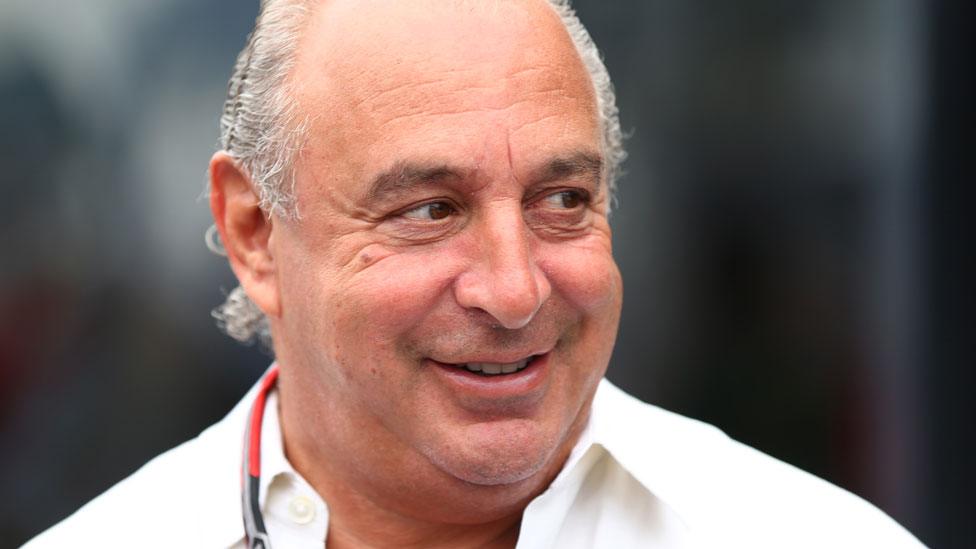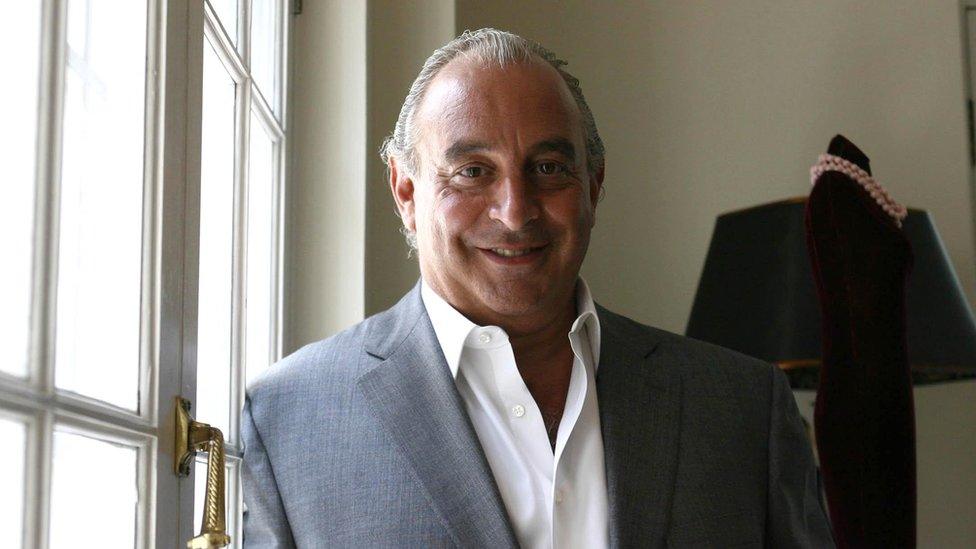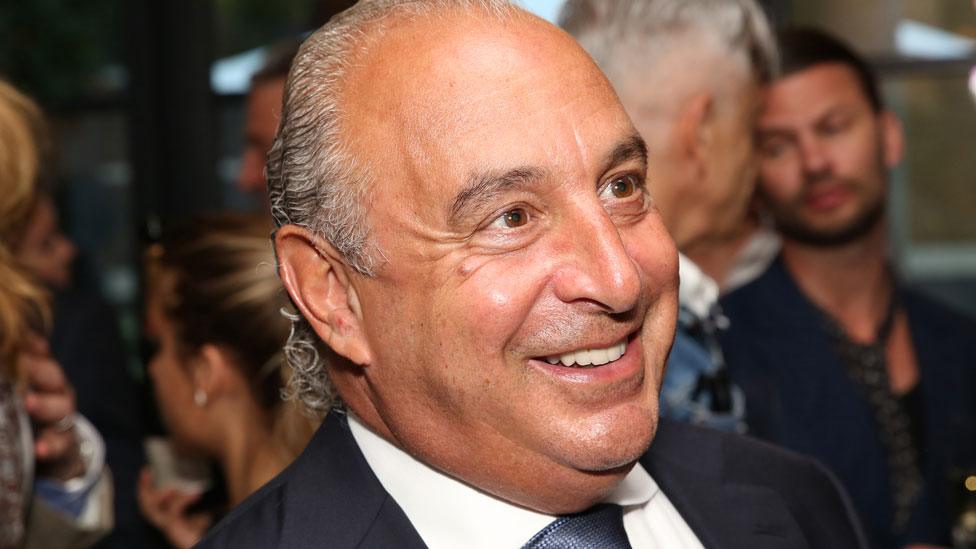Sir Philip Green named over harassment claims
- Published

Sir Philip Green at the Monaco Formula One Grand Prix in May 2014
Retail billionaire Sir Philip Green has been named in Parliament as the leading businessman accused by a newspaper of sexual and racial harassment.
Peter Hain, who identified him in the Lords, said it was his duty to name him, given the "serious and repeated" nature of the allegations.
The Telegraph accused but did not name the businessman on Tuesday.
Sir Philip "categorically and wholly" denied allegations of "unlawful sexual or racist behaviour".
The Court of Appeal issued an injunction preventing the newspaper from publishing Sir Philip's name. It remains in force, but Lord Hain's statement, made under parliamentary privilege, has been widely reported in the UK media.
The peer said publication of the story was "clearly in the public interest".
The Telegraph said, external it had spent eight months investigating allegations of bullying, intimidation and sexual harassment made against Sir Philip.
Lord Hain said the details were "clearly in the public interest"
What were the allegations made in the Telegraph?
The newspaper reported that interviews with five members of staff revealed that victims had been paid "substantial sums" in return for legal commitments not to discuss their alleged experiences.
The BBC has not been able to verify the allegations contained in the Telegraph's report.
Lord Hain said he had been contacted by someone "intimately involved in the case".
He said that given the use of non-disclosure agreements (NDAs) "to conceal the truth about serious and repeated sexual harassment, racist abuse and bullying", he felt it was his duty under parliamentary privilege to name Sir Philip as the individual in question.
Parliamentary privilege protects MPs or peers from being prosecuted over statements made in the Commons or Lords and is one of the oldest rights enshrined in British law.
What does Sir Philip say?
Sir Philip said in a statement on Thursday night that he and his company, Arcadia, "take accusations and grievances from employees very seriously and in the event that one is raised, it is thoroughly investigated.
"Arcadia employs more than 20,000 people and in common with many large businesses sometimes receives formal complaints from employees.
"In some cases these are settled with the agreement of all parties and their legal advisers. These settlements are confidential so I cannot comment further on them."
What has the reaction been?
Liberal Democrat leader Sir Vince Cable said Sir Philip "should certainly be stripped of his knighthood" if the allegations were proved to be correct.
Frank Field, who chairs the Work and Pensions Committee, said a mechanism was needed to allow the voices of abuse victims to be heard in Parliament.
"This would develop the role of the House of Commons in a way which stands up for people who have little money, against those who have much," he said.
The MP planned to raise the issue with ministers was a matter of urgency.

Sir Philip Green was knighted in 2006 for services to the retail industry
Who is Sir Philip Green?
By Simon Jack, BBC business editor
Sir Philip Green has built a fortune from a retail empire that includes Topshop, BHS, Burton and Miss Selfridge.
It was a fortune he didn't mind flaunting - inviting a few hundred of the world's most famous people including Sir Elton John, the Clintons, Elizabeth Hurley and Kate Moss to celebrate lavish 50th and 60th birthday parties.
He portrayed himself as a rags-to riches businessman and his reputation as a great deal maker was further endorsed in 2010 when David Cameron asked him to review whether government procurement departments could get better value for money.
The collapse of BHS saw his crown not just slide, but hit the floor with a clang.
He sold the business to a three-time bankrupt Dominic Chappell - going so far as helping to finance him in order to offload the business and its massive pension scheme deficit.
BHS collapsed soon after leaving 12,000 people out of work and a further 20,000 people facing reduced pensions. During a series of testy encounters with MPs, throughout which he showed his famously volatile temper, Sir Philip promised to "sort" the pension fund - which he eventually did - handing over £363m.
He hoped his reputation could be repaired following that payment. Today's allegations mean he has a new - and possibly bigger - battle to fight.
Why was Lord Hain's intervention unexpected?
By Clive Coleman, BBC legal correspondent
The naming of Sir Philip Green in the House of Lords is a surprising development.
People will remember back to the super-injunction stories of recent years, including the case of footballer Ryan Giggs. When he was named using parliamentary privilege, it was frowned upon.
Parliamentarians and the judiciary alike were very concerned that this privilege should not be used to undermine the rule of law.
And a great effort was made from that time to ensure that this didn't happen again.
So the judiciary is unlikely to be pleased.
The injunction in this case was a court order granted by three of the most senior judges in the country at the Court of Appeal.
It was the rule of law in action. They had before them many facts and evidence to consider and came to a ruling that was pretty emphatic.
We have not got a constitutional crisis on our hands here, but we do have a really significant development in terms of the way in which parliamentary privilege is seen to be used in relation to court orders.

What does Lord Hain say?
The peer told BBC Newsnight he decided to name Sir Philip in the Lords because "what concerned me about this case was wealth, and power that comes with it, and abuse".
He added: "It's for others to judge whether I've been right or wrong, but you know there's no point in being in Westminster ... if you never deploy the precious rights of parliamentary privilege, to be used - as I've said - extremely carefully with integrity and very responsibly."
There had been some criticism of his decision on social media, but Lord Hain added: "I've had overwhelming support - particularly from women."
Camilla Tominey, associate editor of the Telegraph, told BBC Radio 4's PM it was "farcical" that Lord Hain was able to name Sir Philip in the House of Lords, but, as the paper remained the subject of an injunction, it was unable to confirm or deny a name.
"It's not the first time it's happened and it won't be the last," she said.
The people who have made the claims had "bravely" come forward to the paper with the accusations, Ms Tominey added.
"We won't ever be naming any of the claimants."
- Published27 November 2020
